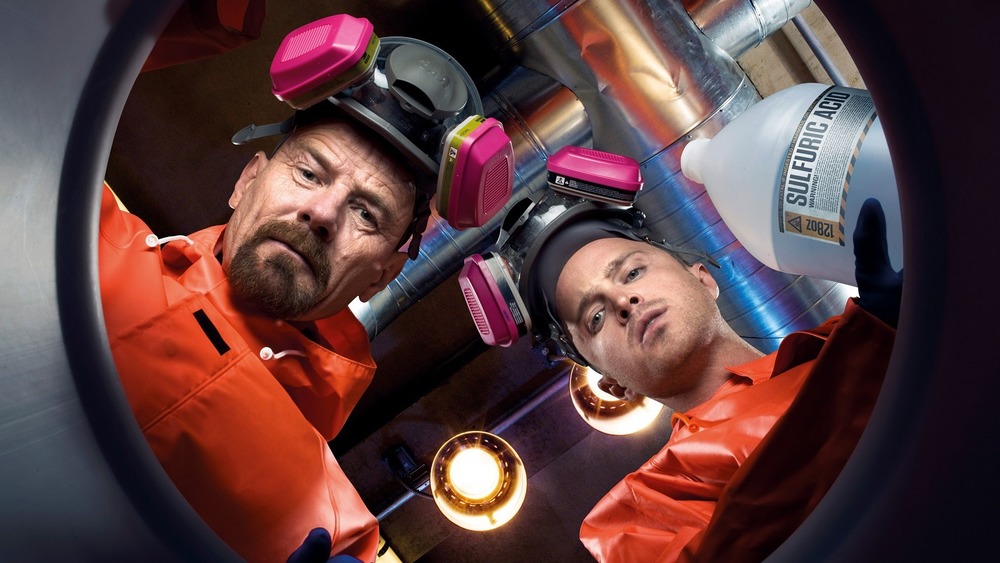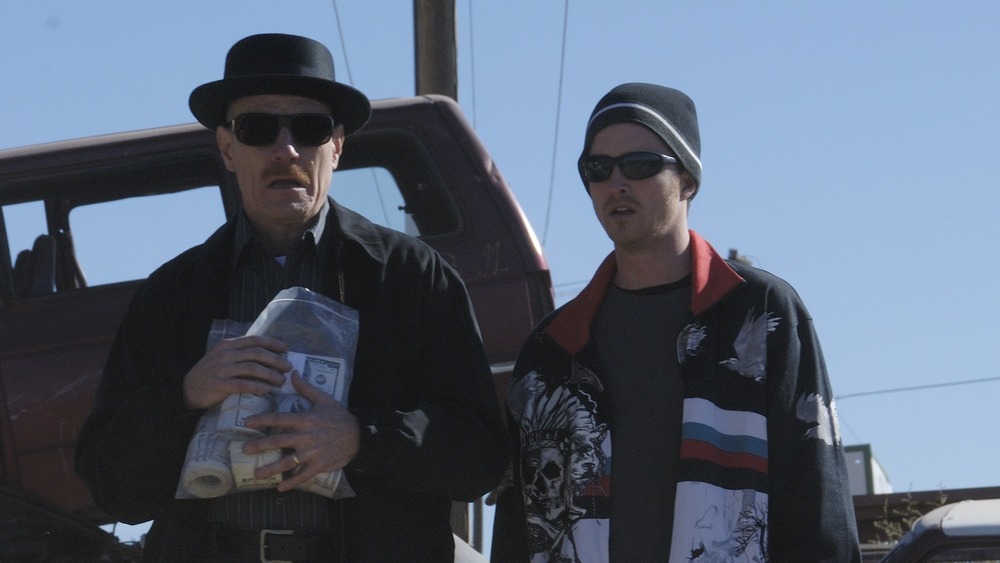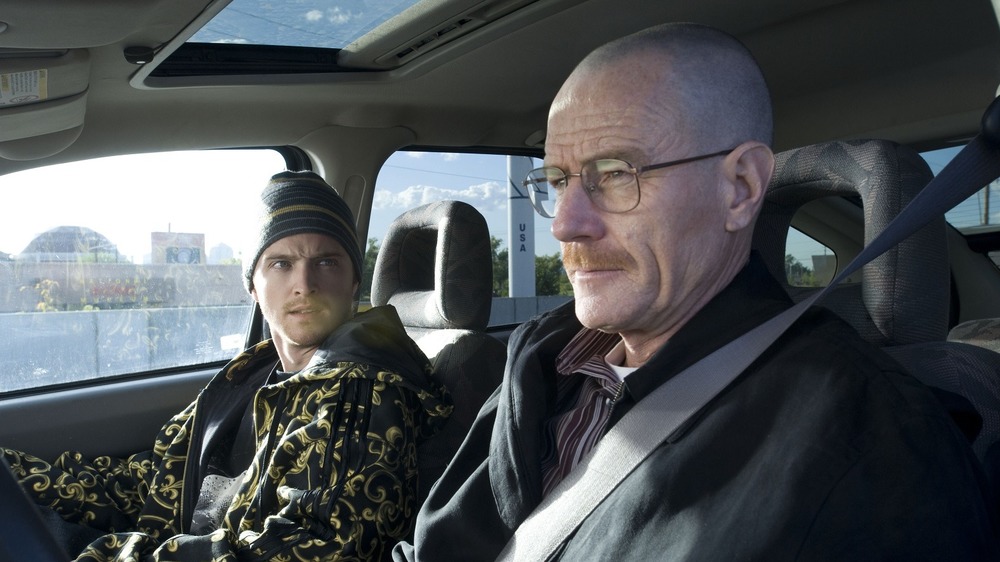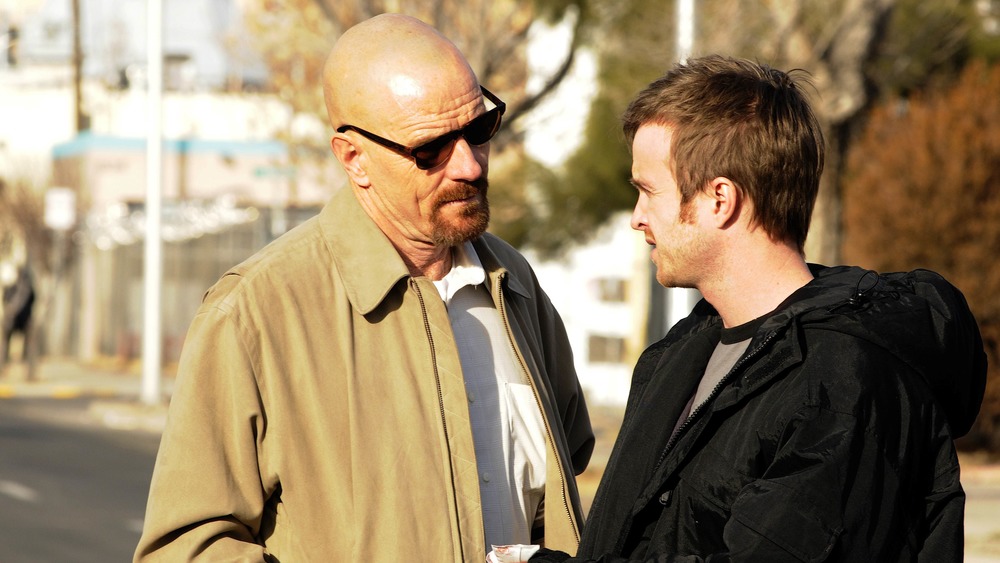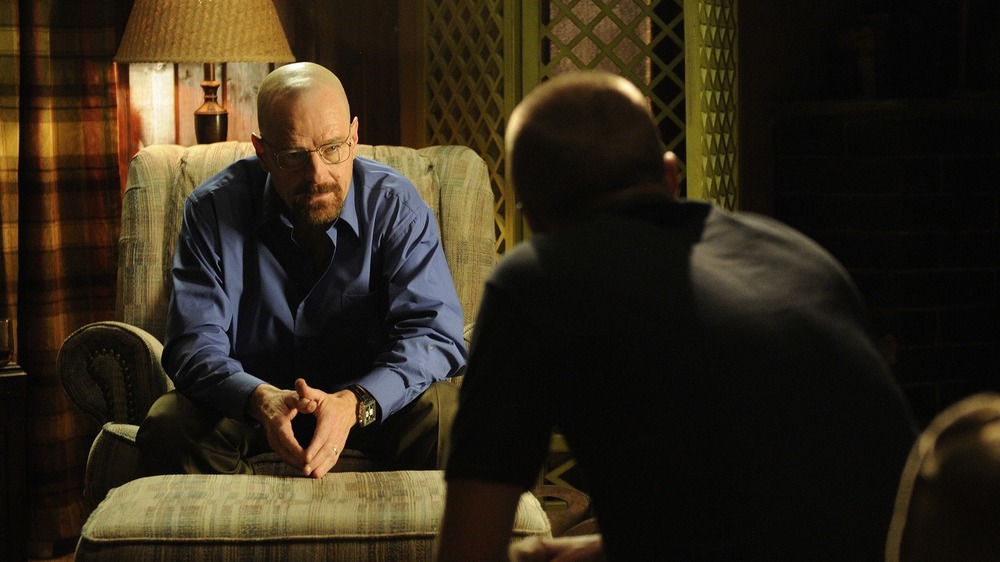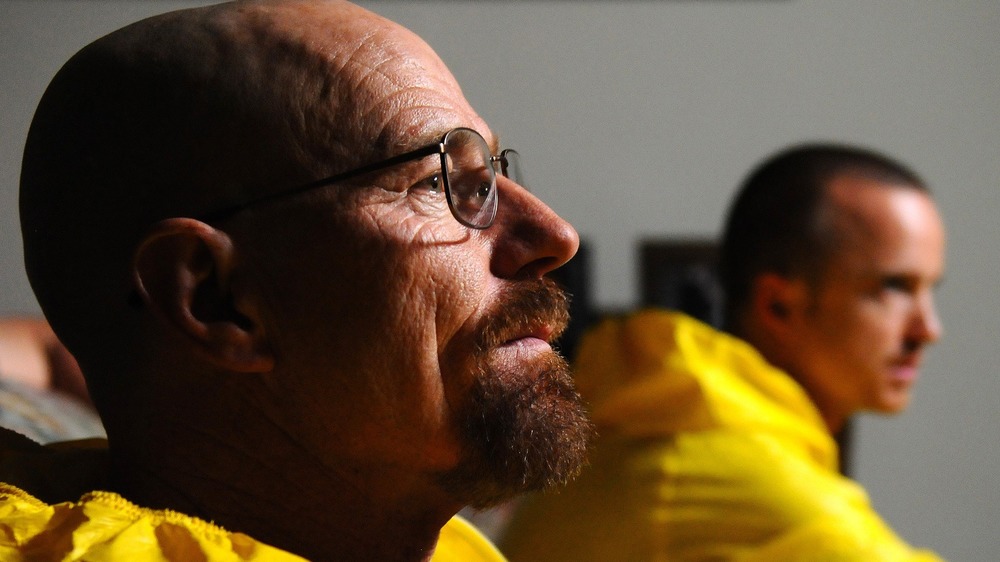The Truth About Jesse And Walt's Relationship On Breaking Bad
The relationship between Walter White (Bryan Cranston) and Jesse Pinkman (Aaron Paul) in Breaking Bad gives all-new meaning to the phrase "dynamic duo." The two are hardly the traditional (anti)hero and sidekick pairing that you might see in other dramas — throughout the course of the series, Walt and Jesse evolve from becoming partners of convenience with little in common to become something close to family to one another, and, at times, they also turn into mortal enemies.
The complexities of the connection between Walt and Jesse arguably form the spine of the show, since so many of the decisions they make in their personal lives are directly related to what this happening between them in their professional partnership. As much as things change for Walt and Jesse, though, there are still a few constants that can be found throughout their story, so let's take a deeper look at the truth about their relationship on Breaking Bad.
Their partnership is imbalanced from the start
When Walt first recruits Jesse to help him get into the meth business in the pilot, he does so with a threat: Either Jesse cooks with Walt, or Walt turns Jesse in to the police. As his former teacher, Walt has always held a position of power over Jesse, and he makes it clear at the outset that this will not change even during their new arrangement, and Walt maintains his position of dominance over Jesse throughout the show. He memorably tells Gustavo Fring (Giancarlo Esposito) in season 2's "Mandala" that the reason he continues to work with Jesse in spite of his addiction struggles is "because he does what I say," confirming that Walt regards Jesse as servile to him.
After Walt temporarily steps away from the business in season 3, Jesse reveals that he has made Blue Sky on his own and wants to sell directly to Gus, but Walt immediately trashes Jesse's work and cuts him out of the arrangement with Gus to prove to Jesse — and himself — that he is still number one. The only time Walt is willing to concede that Jesse is a talented cook and agrees to a 50-50 partnership is when Jesse threatens to take Walt's brother-in-law Hank Schrader (Dean Norris) for everything he's worth after being battered by him in a fit of rage. Even then, Jesse seems to know that Walt does not truly regard him as an equal.
Walt does care for Jesse in his unusual way
Walt may not respect Jesse as a peer, but he does come to genuinely care about him in a semi-familial sense. He overtly says as much in season 2's "Phoenix," when he meets up with Jane Margolis' (Krysten Ritter) father Donald (John de Lancie) by happenstance and refers to Jesse as his "nephew," whose well-being Walt is concerned with. He certainly thinks less of Jesse for using drugs, but he also worries about his health and the possibility of Jane taking advantage of Jesse by demanding his money from Walt. Jesse also appears to care about Walt's health and celebrates in earnest when Walt's cancer is in remission.
At times, Walt also treats Jesse like a fond student, like in "4 Days Out" when he attempts to talk Jesse through the chemistry of making a battery, even though he's been frustrated by what Jesse has done to necessitate that invention. He can also be quite possessive of Jesse, as he grows jealous when Jesse earns a place in Gus' inner circle and grows close to Mike Ehrmantraut (Jonathan Banks) in season 4, and he even manipulates Jesse into leaving Andrea Cantillo (Emily Rios).
Even though Walt does have some emotional attachment to Jesse, though, he avoids spending time with him outside of work-related situations. Not only does Walt work hard to keep Jesse away from his home and family, only inviting him inside once, but he also repeatedly spurns Jesse's offers to do things together. He even declines an opportunity in season 4's "Open House" to go go-karting with Jesse at a time when Jesse desperately needs a distraction from his guilt over his murder of Gale Boetticher (David Costabile), which he did for Walt.
They have very different attitudes about all the bloodshed
When we first meet Walt he is a completely harmless high school teacher, but by the end of the show, he is a violent kingpin who has killed over a dozen people — hundreds, if you count the other people whose deaths he circuitously caused, like the 167 victims of the Wayfarer 515 crash. While Walt initially struggles with the task of killing Domingo "Krazy-8" Molina, he becomes far less hesitant to resort to violence over time, even going so far as to poison the child Brock Cantillo (Ian Posada) to turn Jesse against Gus.
Meanwhile, Jesse is mostly resistant to violence and is deeply affected when he is involved in certain deaths. Walt shows his respect for Jesse's nonviolent demeanor by stepping in to handle Gus Fring's two rival dealers who ran afoul of Jesse by killing Andrea's brother Tomás in season 3's "Half Measures." However, he also forces Jesse to engage in violence on multiple occasions, including bullying him into confronting the addicts who stole from Skinny Pete (Charles Baker) in season 2 and sending him to assassinate Gale. He also asks him to kill Gus, which Jesse cannot do.
Walt is also willing to tolerate a great deal of collateral damage, while Jesse is not. This major difference comes to a head with the murder of little Drew Sharp (Samuel Webb) by Todd Alquist (Jesse Plemons) after the train heist in season 5's "Dead Freight." Jesse completely withdraws after the boy's death, while Walt continues to work with Todd and even finds him charming for his close attention in the lab. Walt's indifference disturbs and disappoints Jesse.
They finally stop trying to protect each other
For most of Breaking Bad, Walt and Jesse fight hard to protect each other from would-be executioners: Walt talks Tuco Salamanca (Raymond Cruz) out of killing Jesse in season 2's "Grilled" by saying he cannot work without him; Walt also shields him from Gus' wrath about Gale's murder in season 4's "Box Cutter" by saying Gus will need to kill them both if he kills Jesse; and Jesse returns the favor in "Crawl Space" by insisting to Gus he cannot kill Walt if he wants Jesse to run his lab.
Walt also tries to protect Jesse from himself by sending him to the Disappearer (Robert Forster) so Walt can deal with Hank alone. Though Jesse is bitter with Walt for never caring about him and continuing to manipulate him, he agrees — that is, until he discovers it was Walt who poisoned Brock. After that, Jesse is ready to literally go scorched earth on Walt, nearly setting his house on fire before agreeing to work with Hank to nail Walt for his many crimes. In season 5's "Rabid Dog," Jesse even calls Walt "the devil."
Though Walt is initially willing to meet with Jesse to talk things through, he eventually sics Jack Welker (Michael Bowen) and his neo-Nazi goons on Jesse, which inadvertently leads to the murder of Hank. After that, Walt legitimately decides he wants Jesse dead, and his rage is incandescent. He points out Jesse's hiding spot to Jack and even tells Jesse that he personally let Jane die. After so many months of repeatedly putting themselves in harm's way to save each other, they finally reach a shocking point of no return.
Walt saves Jesse one last time
In Breaking Bad's penultimate episode, "Granite State," Walt is close to succumbing to his cancer recurrence and decides to surrender himself to the authorities after his son rejects his offer of money. However, a news report with Gretchen (Jessica Hecht) and Elliot Schwartz (Adam Godley) alerts Walt to the fact that Blue Sky is still on the market, which leads him to Jack's compound in the finale, "Felina."
By criticizing Jack for partnering with Jesse, who he promised to kill, Walt ensures Jesse is in the room when his machine gun party begins. It is unclear whether Walt wants Jesse to also become a victim of the blast, but once he sees Jesse's scars and chains, he feigns a fight to get in a position to once again protect his former protégé. After taking a bullet, Walt hands his gun over to Jesse to finish the job, but Jesse declines. Notably, Jesse does not try to save Walt by offering to take him to a hospital for his mortal wound, but in the end, he also refuses to be the one to kill his former mentor and gives him a nod of gratitude and goodbye before taking off in Todd's El Camino.
Whether Walt went to the compound to save Jesse or to finish him off along with everyone else is up for debate (although creator Vince Gilligan has hinted that it was always his intention to save Jesse). Whatever the case may be, Walt's most redemptive quality in his road to self-destruction was always his protective spirit over Jesse, so it's fitting that Walt's final act is to save him one last time.
